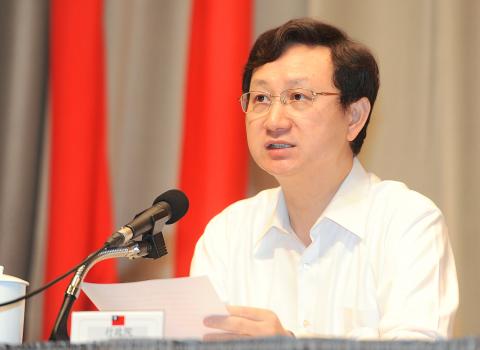The Cabinet yesterday passed amendments to the Labor Standards Act (勞動基準法) proposed by the Ministry of Labor, which would introduce “one fixed day off and one flexible rest day” — or yili yixiu (一例一休) — as two weekly days off to guarantee the realization of the 40--hour work week policy, while canceling seven days off for national holidays.
“With efforts from the Ministry of Labor, Executive Yuan staff and the Democratic Progressive Party [DPP] caucus, we have finally produced this version [of amendments]. Despite all the difficulties, it is a more feasible version that would lead to as little conflict as possible,” Premier Lin Chuan (林全) was quoted as saying by Cabinet spokesman Tung Chen-yuan (童振源) in a post-meeting news conference. “However, there are still differences of opinion, and we need to continue to communicate with the public.”
According to the ministry’s proposed amendments, employers may ask employees to work on their “fixed day off” only in the event of a natural disaster or emergency, and would have to compensate employees with double salary for the day plus an additional day off to make up for it.

Photo: Chang Chia-ming, Taipei Times
Regarding the “flexible rest day,” employers may ask employees to work after obtaining their consent, but are obligated to provide additional pay, ranging from one and one-third to one and two-thirds times the worker’s basic salary.
However, employees would not get an extra day off if they work on a “flexible rest day.”
Moreover, the proposal would also cancel seven holidays for workers to make all workers, including civil servants, enjoy the same number of national holidays.
The Cabinet’s final amendment proposals drew fire from both labor rights advocates and businesses.
Labor rights activists have been calling for two fixed days off per week and to keep the seven national holidays, while businesses have complained about the high overtime pay they have to offer employees to have them work on a “flexible rest day.”
The seven holidays that the ministry proposed to cancel were also a point of dispute as the government has revised its stance about whether to keep the holidays several times, and has been accused by labor activists of breaking its promise.
Separately, DPP caucus chief executive Wu Ping-jui (吳秉叡) said after a lunch meeting with the premier that the caucus would seek to pass the amendments in September.
“The premier would like the amendments to be passed as soon as possible, so that businesses can more accurately calculate their costs,” Wu said.
He said that not all caucus members supported the proposals, but added that working conditions would improve with the amendments, as they would require employers to provide more overtime pay and obtain consent from their employees to have them work on their rest days.

CHAOS: Iranians took to the streets playing celebratory music after reports of Khamenei’s death on Saturday, while mourners also gathered in Tehran yesterday Iranian Supreme Leader Ayatollah Ali Khamenei was killed in a major attack on Iran launched by Israel and the US, throwing the future of the Islamic republic into doubt and raising the risk of regional instability. Iranian state television and the state-run IRNA news agency announced the 86-year-old’s death early yesterday. US President Donald Trump said it gave Iranians their “greatest chance” to “take back” their country. The announcements came after a joint US and Israeli aerial bombardment that targeted Iranian military and governmental sites. Trump said the “heavy and pinpoint bombing” would continue through the week or as long

TRUST: The KMT said it respected the US’ timing and considerations, and hoped it would continue to honor its commitments to helping Taiwan bolster its defenses and deterrence US President Donald Trump is delaying a multibillion-dollar arms sale to Taiwan to ensure his visit to Beijing is successful, a New York Times report said. The weapons sales package has stalled in the US Department of State, the report said, citing US officials it did not identify. The White House has told agencies not to push forward ahead of Trump’s meeting with Chinese President Xi Jinping (習近平), it said. The two last month held a phone call to discuss trade and geopolitical flashpoints ahead of the summit. Xi raised the Taiwan issue and urged the US to handle arms sales to

BIG SPENDERS: Foreign investors bought the most Taiwan equities since 2005, signaling confidence that an AI boom would continue to benefit chipmakers Taiwan Semiconductor Manufacturing Co’s (TSMC, 台積電) market capitalization swelled to US$2 trillion for the first time following a 4.25 percent rally in its American depositary receipts (ADR) overnight, putting the world’s biggest contract chipmaker sixth on the list of the world’s biggest companies by market capitalization, just behind Amazon.com Inc. The site CompaniesMarketcap.com ranked TSMC ahead of Saudi Aramco and Meta Platforms Inc. The Taiwanese company’s ADRs on Tuesday surged to US$385.75 on the New York Stock Exchange, as strong demand for artificial intelligence (AI) applications led to chip supply constraints and boost revenue growth to record-breaking levels. Each TSMC ADR represents

State-run CPC Corp, Taiwan (CPC, 台灣中油) yesterday said that it had confirmed on Saturday night with its liquefied natural gas (LNG) and crude oil suppliers that shipments are proceeding as scheduled and that domestic supplies remain unaffected. The CPC yesterday announced the gasoline and diesel prices will rise by NT$0.2 and NT$0.4 per liter, respectively, starting Monday, citing Middle East tensions and blizzards in the eastern United States. CPC also iterated it has been reducing the proportion of crude oil imports from the Middle East and diversifying its supply sources in the past few years in response to geopolitical risks, expanding